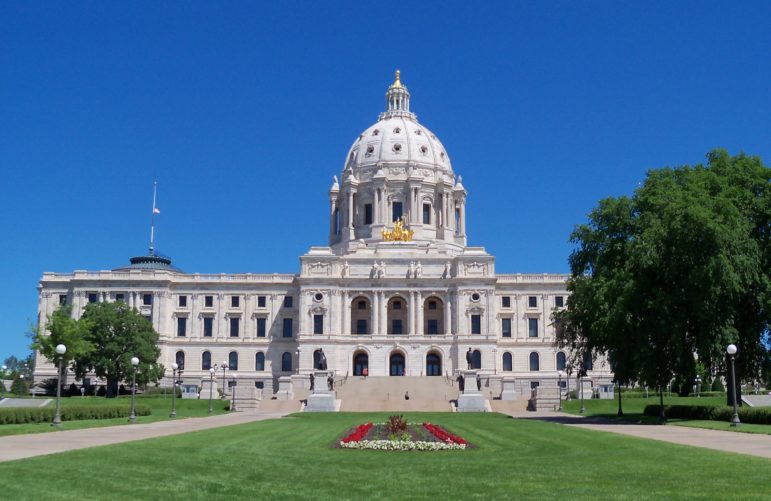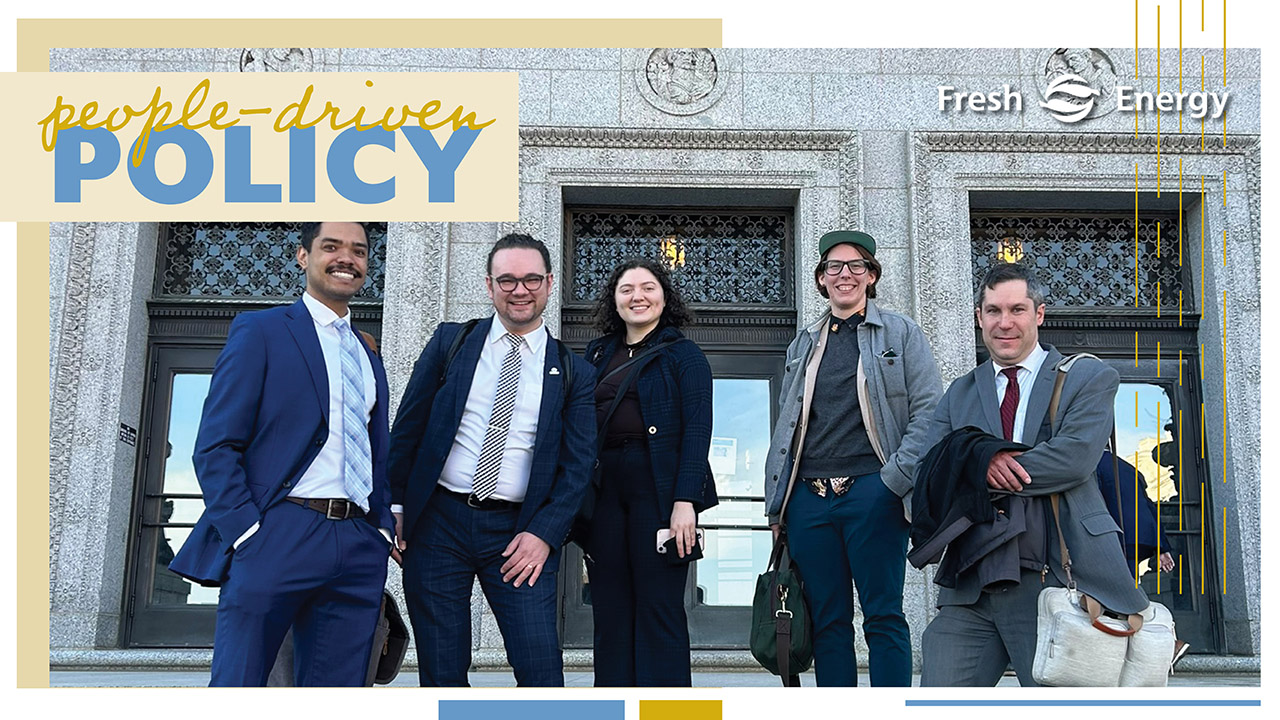
It often feels like our politics—locally and nationally—have never been more polarized. While in recent years, partisan dysfunction at the Minnesota Legislature has led to virtually no major policies of consequence being accomplished on energy and climate, we’re pleased that 2021 has turned out differently. Against the odds, this appears to be the most impactful years for energy in quite some time. Last month, we wrote about final passage of the Energy Conservation and Optimization (ECO) Act during the last weeks of the regular session. A major modernization of Minnesota’s flagship energy efficiency program, the ECO Act is a landmark energy policy accomplishment by a broad coalition that includes Fresh Energy. The ECO Act alone gives us a lot to celebrate, but that wasn’t all the Minnesota Legislature had in store.
Earlier this week during the special session, the Minnesota Legislature completed work on the 2021 Energy and Commerce Omnibus bill. Within the bill are significant new investments in solar energy, new policy support for a just and equitable transition to clean energy, and innovative new decarbonization strategies for Minnesota’s gas utilities. Fresh Energy, collaborating with a tremendous coalition of partners and stakeholders, worked hard to help make the final product as robust and forward-thinking as possible. And overall, we’re pleased with the results.
To be clear, the climate crisis demands truly transformational action and the omnibus bill falls short of that target—there’s much more that needs to be done. However, here in Minnesota—the only state with split-control legislature in the country—we’ve shown how bipartisan cooperation can result in outcomes that reduce emissions, grow jobs, and save money.
The final bill comes in at 144 pages but don’t worry, we’re not going into detail on all of it. Here are some of the major highlights:
Natural Gas Innovation Act
While we have made significant progress decarbonizing our electricity system, we have a tremendous amount of work to ensure that our fossil gas system decarbonizes at the speed that climate science requires—progress that, currently, isn’t really happening at all. The Natural Gas Innovation Act (NGIA) establishes a framework for decarbonizing Minnesota’s gas and dual-fuel utilities and making new investments in a range of alternatives to fossil gas, including strategic electrification, aggressive energy efficiency, and carbon-free district heating systems, as well as “renewable” natural gas (RNG). If you’re curious about RNG, learn more here.
A particularly key component of the NGIA law is a requirement that the Minnesota Public Utilities Commission (PUC) open an “exploratory docket” into the future of gas utilities and how gas utilities can help ensure that Minnesota meets or exceeds our state greenhouse gas reduction goals. The PUC will open this docket no later than August 1, 2021. This will be a critical venue for energy and climate stakeholders to engage and make their voices heard as we fight to equitably decarbonize our buildings—the fastest-growing source of emissions in Minnesota.
Investments in Solar
The final package includes a suite of new investments in Minnesota’s growing solar energy sector. In 2013, Fresh Energy worked with a broad coalition to pass the Solar Energy Jobs Act, establishing Minnesota’s first solar standard and our nation-leading community solar gardens program. This year’s package is far and away the most significant solar package for Minnesota since that landmark 2013 legislation. Among the key components are:
- More than $16 million in new resources for schools to save money by installing solar on site.
- A two-year extension for Xcel Energy’s popular Solar Rewards program, which provides incentives for homeowners and small businesses who install solar on their properties.
- An innovative “brightfields” projects to install solar on a closed landfill in Anoka County. Solar has enormous development potential for traditionally unusable/uneconomic lands, and this project is a great example.
Workforce and Community Transition
Clean energy technologies from wind and solar to batteries to energy efficiency have tremendous job creation and economic development potential for Minnesota. However, who does and doesn’t have access to those jobs is not a given. Individuals from some communities and demographic groups simply have more and better access to both training and employment opportunities in the clean energy sector.
In addition, Minnesota’s transition away from fossil fuels creates very real local and regional challenges as fossil fuel jobs disappear and power plant host communities suffer losses to their local tax base. Often, these host communities are left scrambling to figure out how to manage their transition, with little public support and generally no roadmap to follow.
Fortunately, the energy and commerce omnibus includes some important policies that address these issues—often referred to by advocates as pursuing a “just transition.”
- $2.5 million for the Northgate workforce training center in North Minneapolis. Clean energy jobs often require specialized skills and training, and this new facility will help create access to these kinds of resources in a community where they do not currently exist.
- A new office of community transition at the Minnesota Department of Employment and Economic Development to develop economic and workforce transition planning support for existing power plant host communities.
Clean Cars Minnesota
Although not part of the Energy and Commerce Omnibus, a major sticking point down the homestretch of the session was the Walz Administration’s Clean Cars Minnesota proposal. Announced in September of 2019, Clean Cars Minnesota would adopt low emission and zero emission vehicle standards, following in the footsteps of 15 other states from around the country. Clean car standards are an important tool for reducing emissions from the transportation sector, which is the largest source of climate change pollution both in Minnesota and nationally.
Despite validation of the rulemaking process in district court as well as approval from an administrative law judge, Senate Republicans threatened to block the entire environment funding bill—including funding for state parks, fisheries and other environmental agencies—if the House and Governor did not agree to repeal or delay the proposed clean cars rules. Thanks to thousands of Minnesotans weighing in to support clean car standard through both the formal rulemaking process and directly with lawmakers, the stalemate ended with no action by the Legislature to impede or delay the rules from taking effect. Fresh Energy has been helping to lead the fight for clean car standards in Minnesota for over a decade—we’re grateful to the many individuals and organizations that have contributed to this historic victory!
As the dust settles from the 2021 session, it is clear that energy and climate advocates have a lot to be proud of. It is also clear that we are still not close to acting at the speed and scale that the climate crisis requires. Fresh Energy is already beginning the work of planning for 2022 and we’ll be sure to provide plenty of updates here as that work progresses!
Tune in to our June 28, 2021, episode of “Decarbonize: The Clean Energy Podcast” for a deeper conversation on this topic with Fresh Energy’s Executive Director Michael Noble, Lead Director of Public Affairs Justin Fay, and Senior Associate of Public Affairs Anna Johnson.

